 Alkemia: Destiny's Recipe
Alkemia: Destiny's Recipe
Designer: Kinsoul Studio
Format: Hand Management, Set Collection, Tile Laying, Exploration
Number of Players: 2 - 6
Play Time: 90 minutes
Price: $55
Copy Provided By Publisher
PlayNYC gets better every year, and this year it gave me a very special gift. You see, if there’s one thing the online board game community loves asking for, yet reviewers are hesitant to give, it’s reviews of older games. In a world where several thousand new board games are published every year, a rush of titles somewhat mockingly called “the cult of the new,” the community cries out again and again. “Stop this mad rush! Review something that didn’t come out this year!” Sadly, the reviewers answer by asking what good would come of releasing another review for a game that has a dozen already; why bother spending time on a buying guide that no one needs when one could be reviewing something people still want viewpoints on?
Then I played Alkemia at PlayNYC this year. This little gem is one of those games that may have slipped by you after its Kickstarter fulfilled, but trust me when I say that if you’re looking for a thematic game that lets you feel like an alchemist, transmuting elements into powerful artifacts, look no further!
You know what else? It didn’t come out this year or even last year. It came out back in 2017! File this one under the “new to me this year” category. It’s totally worth your time, so let’s dive right in.
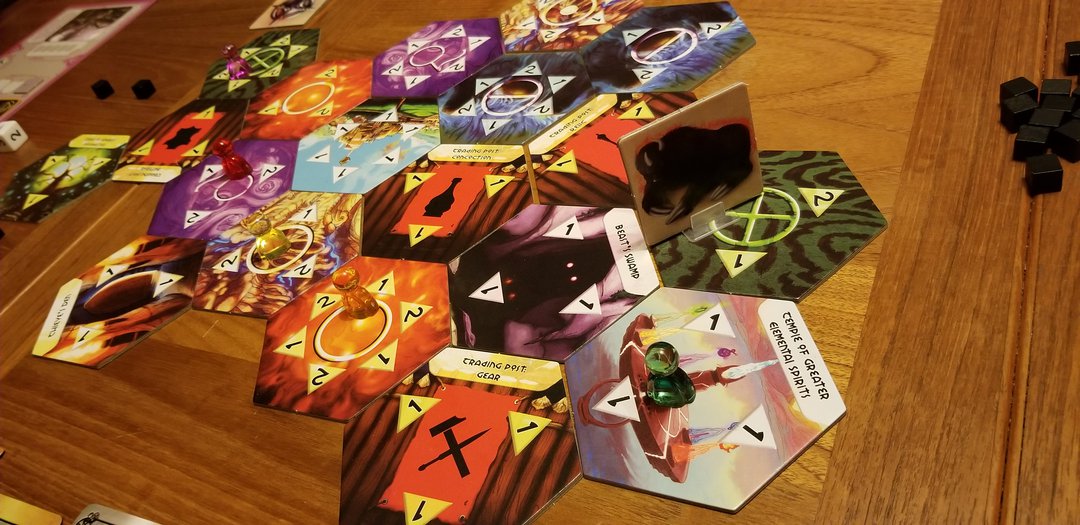
Colorful, enticing, and not nearly as hard to learn as it seems!
More Than The Sum Of Its Parts
I can safely speak for the entire Sprites and Dice staff when I say we all had the same impression looking at this game the first time. The tiled board with 5 different colors and symbols, the special spaces offering no description of what they do, four additional decks of craftable recipes, and player mats with variable player powers. It looked complex and dry, pretty much the opposite of fun. Alkemia is anything but! You think you’re looking at a heavy, mechanical nightmare, but what you’re about to experience is an easy to teach, thematic strategy game of hand and resource management splashed with a healthy dose of on-the-map player interaction. All those elements overwhelming us at first were really like the theme they represent, just single components you combine into glorious creations in your pursuit of knowledge. One turn around the board and we were off at a running pace.
On each turn you receive an income of action points, five plus the roll of a three-sided die (more on this in a bit). You then spend these points to move and take actions on the board, usually drawing handfuls of element cards matching the tile you’re standing on, and you use a second special currency called “seed” to purchase additional crafting recipes and activate the other unique tiles.
Cards themselves can be spent for a variety of special powers printed on them or for their symbols they contribute to craft recipes, and they can be discarded for more seed, so balancing what you save and what you can afford to burn is always a delicate juggling act. The players take turns mustering enough ingredients to craft one of their known recipes, flipping over those cards as they do so, revealing the completed item on the reverse side, and netting themselves a new special power. Sprinkle in some interplayer effects and a myriad of terrain based toughness and you’re left with that feeling any great game should impart: that feeling of wanting to do everything but being just a card or two short! Better prioritize and make some hard decisions.
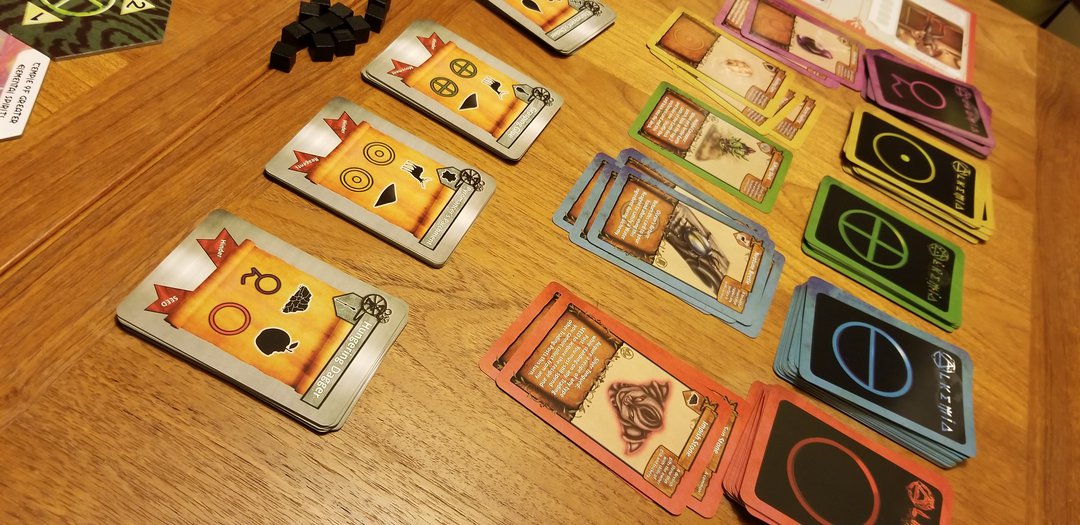
So many flavors of cards let you cook up the alchemical meal you've always wanted.
Play continues like this until a player crafts six alchemical goodies, and then they’ve managed enough experience to deduce the recipe for the Ultimate, Lost Masterthingy (winning usually follows very quickly). Alkemia is essentially a race, but this race isn’t quite so easily won! Those recipe cards you flip over as you craft? The effects, much like in our review of Epic, are all incredibly powerful. Crafting one not only puts you 1/6th of the way to victory but also gives you a crazy ability to sling around. It feels really good crafting magical items and concoctions, and it’s never tiring hearing your friends say, “I’m sorry you can do what now?” You get attached to these trinkets you’ve made, but unfortunately for you creating the Ultimate Masterthingy involves the occasional sacrifice of your magical items! Do you take the time to make another just so you don’t lose a favorite charm? Or do you keep pace with a speedy opponent and throw your best items into the fire?
The game gets faster and faster as you go. Halfway to the win players will unlock a special randomized item on their player boards, displaying their impending mastery of their craft and further accelerating their powers. Players will try to drop card and item effects on their opponents, maybe attacking them with a magical blade or spilling some super glue on their space. Maybe they play a card from their hand that increases the element requirements of another player’s recipes. Others will counter with a well-crafted curative they’ve distilled. There’s some good opportunity to knock over the lab beakers of your nearest opponent, yet the penalties are never so severe that they feel unfair. Even if you don’t have a countermeasure you can recover from nearly anything, but that slight setback in tempo you experience may be all your opponent needs. Unless of course your next breakthrough kicks up your pace or gives you a new way to fight back.
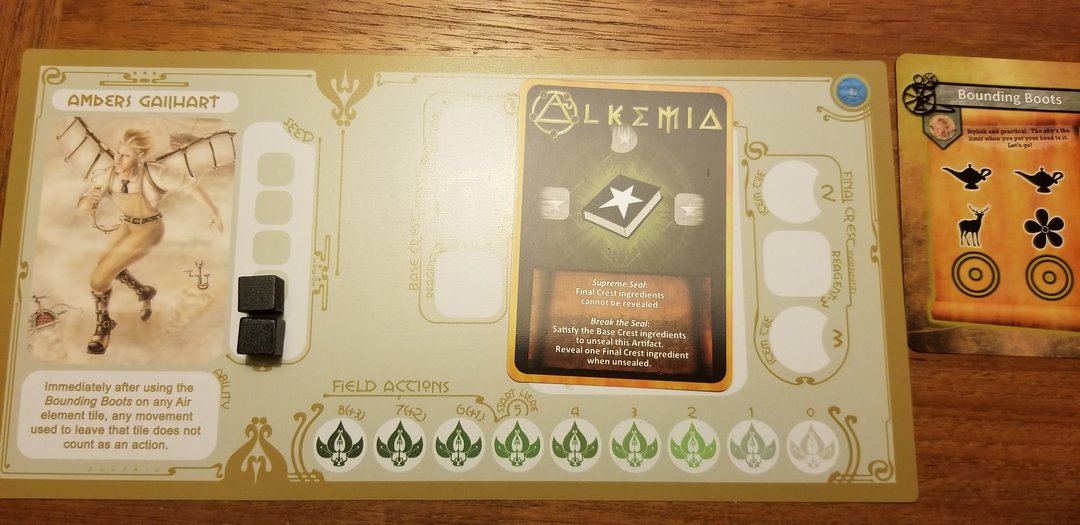
A sample player setup. You get a special starting craft that links to your character's power, and a random super item is dealt to your player mat you unlock as you master your art.
A Peculiar Distillation
We’ve talked plenty about theme and the feel of gameplay to this point, so let’s have a sit down about mechanics. From a balance standpoint, Alkemia is a solid production, and it’s clear from both looking at the game’s clean design (and talking to the developers) that what was once a much more complicated and perhaps overbloated game has been boiled down to the sweet syrup we see today. Every instance of randomness or luck that one could say tips the game in an unbalanced fashion has been accounted for. Every formula has been balanced.
For example, the tiles you flip off the stack to form the map? Players take turns placing them, creating a board of their liking (including impassable “gaps” if they like), and yet if you find yourself on the opposite side of the world from the element you need, some of the special spaces or powers allow you to mitigate the board and nab needed resources. The “reshuffle” tile lets you take a free element from the deck you restock, and if you get it when everything’s in the discard you get to take a card of your choice before shuffling instead of just the top card afterwards. There’s also a “wild card” space that’s always in high demand. And there’s another that allows you to spend elements at a ratio of any 2 to 1. This is before you even get into card effects that lessen your crafting requirements or steal from other players, so if you’re complaining that you can’t craft any items chances are you’re not taking full advantage of opportunities abounding around you.
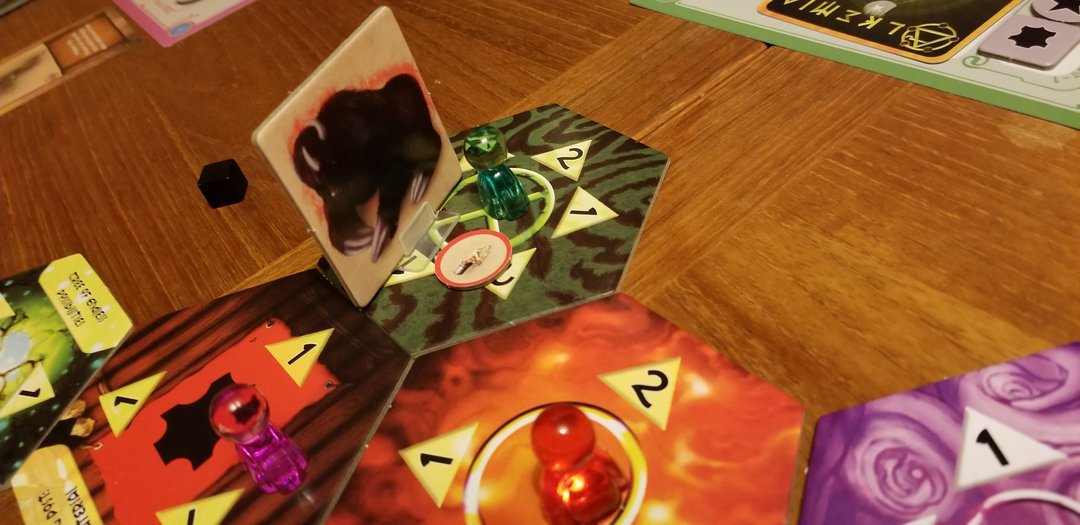
Beware the Beast! He's...well he's not too threatening, but the card he eats could be all the difference in your well-laid plans.
Remember that die roll I mentioned before? At the start of your turn you get 5 action points plus a 3-sided die’s result to fuel most of your actions. Typically, more actions translate to potential for a runaway leader. I can say with certainty, though, that this doesn’t make a big difference in Alkemia. While the slight variance is pleasant in the way you can never quite get everything you’d like done in one turn, players’ progress tends to even out over a whole game. And even in games where some players rolled a large number of 1s while others roll near constant 3s, we’ve had 2 and 3-way photo finishes as player interaction helped to mitigate what would otherwise be an unstoppable force of luck. If someone is running away with the lead, and you draw a card that lets you steal an element from another player, guess who you’re likely to target to get what you need? Overall, we found game balance in the mechanics to be very nicely tuned. Games remained close and tense, as they should be, and not the victim of too much unchangeable chance.
And finally there’s replayability. In any given game, you’ll only see a handful of the myriad of crafting options available, so the combinations you see in a given game are nearly limitless (even if some of them have similar abilities or are countered by the same kinds of other items). In terms of those cards, even though their completed sides are hidden until you flip them, there are little hints printed on the recipe that appear like cute little bookmarks trailing off your recipe book’s page. They give you two clues as to how the item will be used once it’s completed, meaning you don’t need to memorize every item in the game just to know which of the recipes on offer are worth your time; at a glance it’s easy to tell a defensive item from one that will aid you in further crafts or help you attack. It’s a small touch with a big impact and one I’m glad to see. The final product you’re left with is everything you want: a thrilling game that’s more concerned about letting you be a badass alchemist than a researcher with their nose buried in the rulebook. And it’s a game that’s as accessible to newcomers as well as experienced tinkerers.
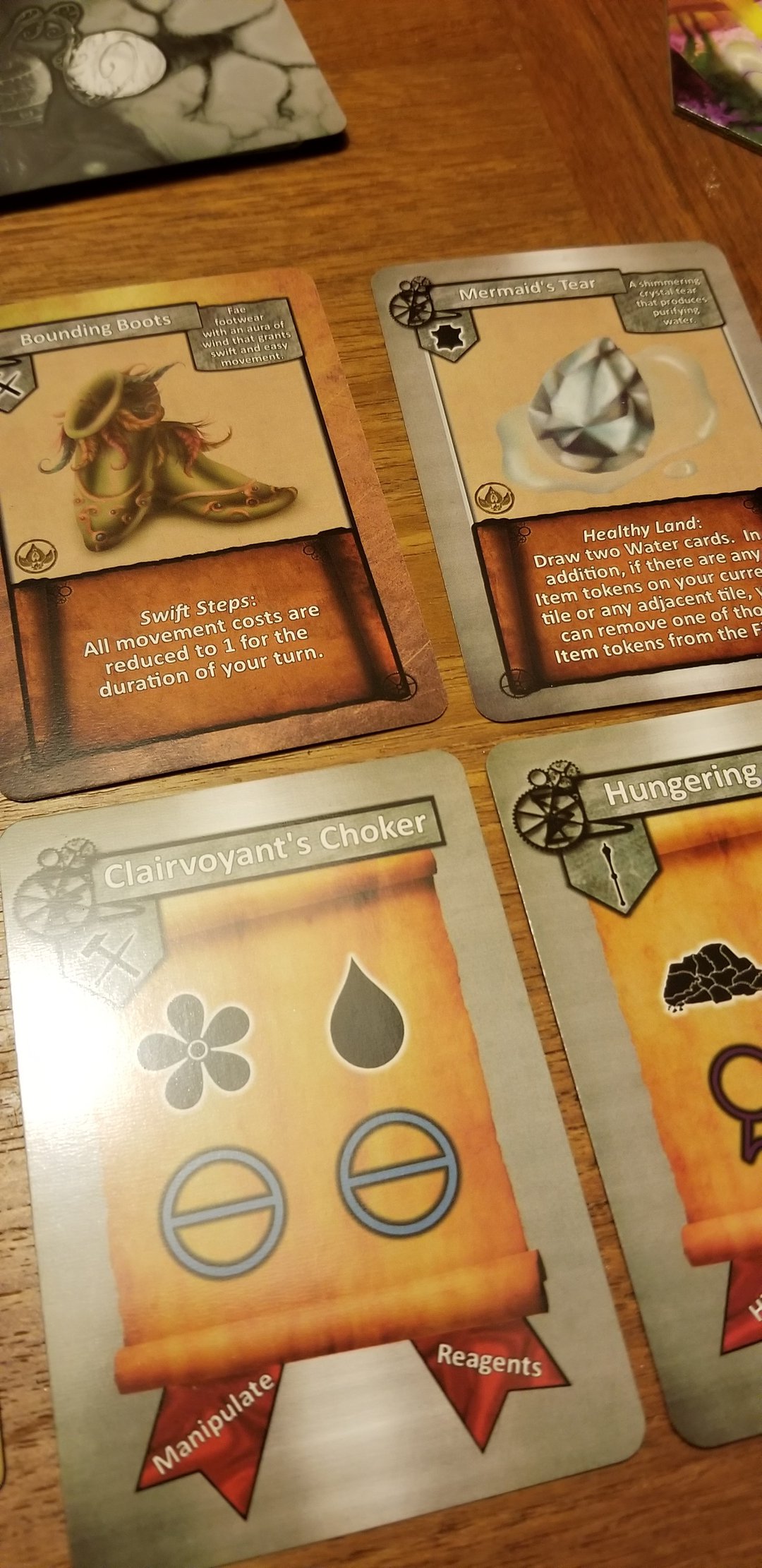
Mermaid's Tear was the star of my game, a curative that let me wash away the nasty effects of other players while fueling me with more card draw!
Caution: Read Before Mixing
So who should stay out of this lab? Well for one, people who hate take-that mechanics are probably not going to have as good of a time with Alkemia. As stated before, the stuff you can get hit with is never game breaking, but it is still targeted aggression. This isn’t a multiplayer solitaire game of engine building and crafting. You can, and will, get in each other’s faces. If you can’t laugh when one player swaps places with you, subsequently putting you in stabbing range of another player for the fourth time that game, you might find the aforementioned interaction less thrilling and more annoying. Also you might be getting the sense that Alkemia is more of a tactical game than a strategic one, and it is. This is more about, pun intended, transmuting the ever changing situation in front of you to suit your needs than it is about forming a grand research thesis that you will see through to the end no matter what.
You also have to be willing to let go. Jokes about Disney music aside, the requirements for the six-part recipe that wins you the game, the one you burn your carefully crafted items to unlock, are determined by tokens drawn randomly from a bag. So while it behooves you to visit each of the workshop tiles and accumulate one of every type of craft, sometimes the bag will just throw the same symbol at you over and over. No lie, in my last game I made the decision to burn up my starter item, a special craft that goes with each player mat and boosts an ability unique to each character, because I could not afford to fall behind my neighbor who was surging ahead in their research. I dearly missed my winged boots of making-my-opponents-eat-my-dust, but the win I pulled out that game confirmed the sacrifice was ultimately worth it!
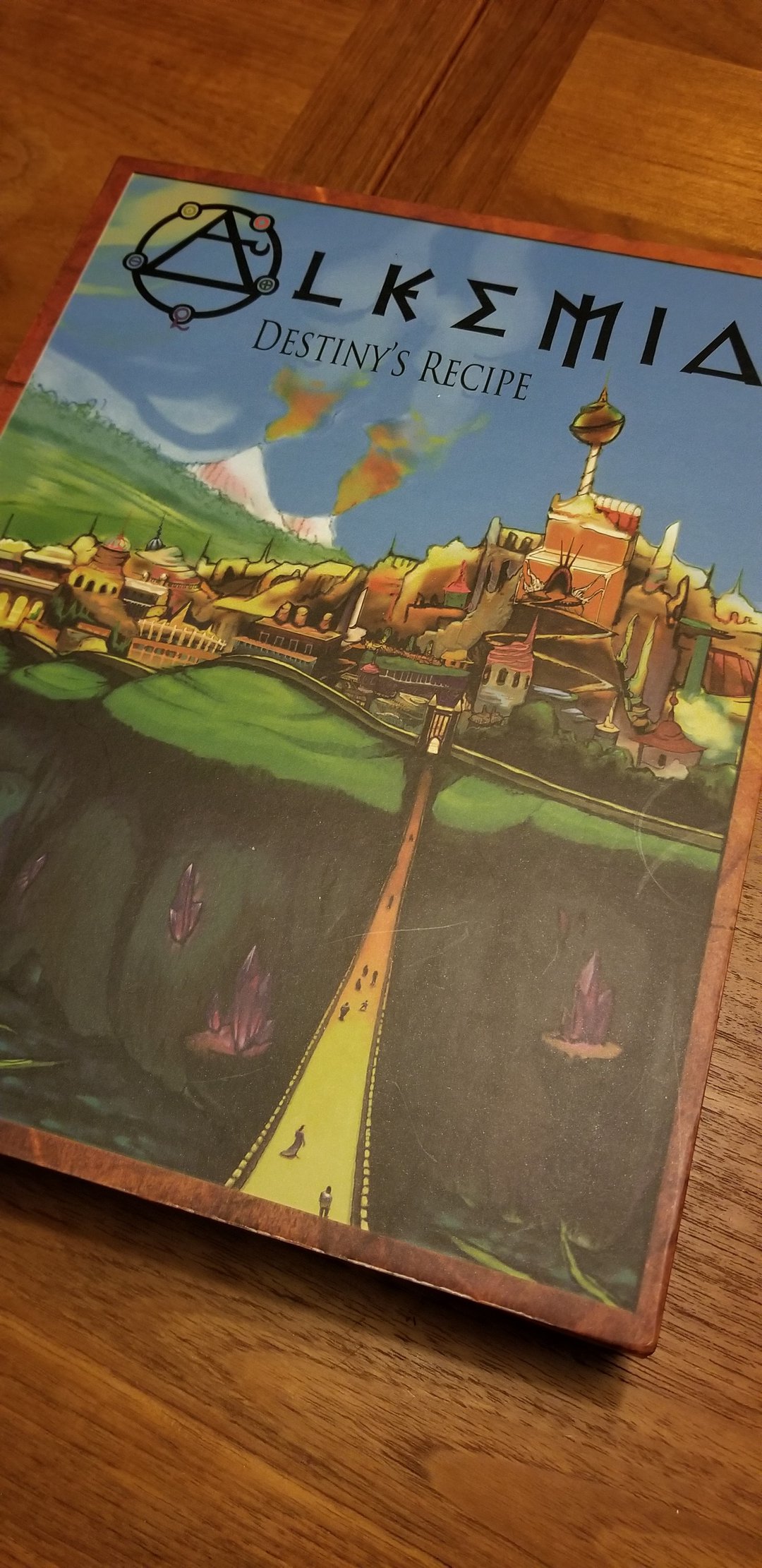
The Theorem’s Conclusion
If there’s one thing that gets me excited more than anything else when it comes to new titles (or titles that are new to me this year), it’s games with heart. Alkemia promises an experience of letting you transmute the elements into all kinds of powerful magical goodies, and it does exactly that. You start the game as a humble alchemist with little more than a recipe for an invention you’ve been tinkering with and a sense of adventure, yet by game’s end you’ve become a master of the elements, you’ve journeyed across the far reaches of the kingdom, you’ve outwitted your rivals, and you’ve made some truly wondrous objects. Theme and mechanics come together here in a wonderful blend of flavor and strategy.
Additionally, in true board game fashion even if you don’t win it’s also fun to look back across the things you’ve created and see your accomplishments. You know, minus the ones you disassembled in your research of the final McGuffin. If Alkemia sounds like a game you think you’ll enjoy, you can find it directly from Kinsoul Studio’s site.